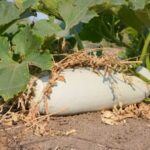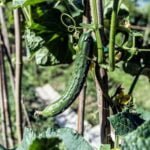Pest control is a crucial aspect of maintaining a healthy and thriving vegetable garden. As vegetable gardeners, we invest time, effort, and resources to grow our own fresh produce. However, pests can quickly destroy all our hard work if left unchecked.
This is why finding effective pest control solutions is essential for ensuring the success of our vegetable gardens. One popular product on the market is Ortho Home Defense, but before we delve into its safety for vegetable gardens, let’s first explore why pest control is so important in this context.
Vegetable gardens are highly susceptible to pest infestations due to their abundant food sources and favorable environmental conditions. Common garden pests can include aphids, caterpillars, beetles, slugs, and many more. These pests not only damage the plants themselves but can also spread diseases that further jeopardize our harvest. Moreover, their presence can attract larger pests like rodents or birds who come seeking an easy meal.
To protect our vegetable gardens from these threats and maximize our yield, it becomes necessary to implement effective pest control strategies. This typically involves a combination of preventive measures such as proper plant spacing and hygiene practices along with interventions such as using pesticides when necessary. But when it comes to using products like Ortho Home Defense specifically designed for household pest control, we need to evaluate their safety for application in our precious vegetable gardens.
What is Ortho Home Defense and How Does It Work?
Ortho Home Defense is a popular brand of pest control products that is commonly used by homeowners to protect their gardens from insects. The main goal of Ortho Home Defense is to provide an effective and convenient solution for eliminating pests and preventing further infestations. This section will delve into the details of what Ortho Home Defense is and how it works.
Ortho Home Defense offers a wide range of products, including sprays and granules, that can be used both indoors and outdoors. These products primarily work by targeting the nervous systems of insects, disrupting their normal functioning and ultimately leading to their elimination. The active ingredients in Ortho Home Defense can vary depending on the specific product, but commonly include chemicals such as bifenthrin, deltamethrin, or lambda-cyhalothrin.
The application process for Ortho Home Defense is typically straightforward. For outdoor use, the product can be sprayed directly onto the affected areas or plants in the vegetable garden. Indoor use involves applying the spray along baseboards, cracks, or other entry points where pests may gain access. It is important to follow the instructions provided on the product label and take necessary precautions such as wearing gloves and avoiding contact with skin or eyes when handling Ortho Home Defense products.
While Ortho Home Defense is known for its effectiveness in controlling pests, it is crucial to consider its potential impact on vegetable gardens. Some gardeners have expressed concerns about the safety of using this product around edible plants due to its chemical composition. In the next section, we will examine the ingredients of Ortho Home Defense in detail to determine whether they are safe for use in vegetable gardens.
| Active Ingredient | Mode of Action |
|---|---|
| Bifenthrin | Attacks nervous system of insects |
| Deltamethrin | Disrupts insect nerves and muscles |
| Lambda-cyhalothrin | Affects nerve cell function in insects |
Examining the Ingredients of Ortho Home Defense
Ortho Home Defense is a popular pest control product that is widely used by homeowners to protect their homes and gardens from various pests. However, when it comes to vegetable gardens, many gardeners are concerned about the safety of using Ortho Home Defense around their edible plants. In this section, we will take a closer look at the ingredients of Ortho Home Defense and determine whether they are safe for vegetable gardens.
One of the key ingredients in Ortho Home Defense is bifenthrin, which is a synthetic insecticide that is commonly used to control various pests such as ants, spiders, and cockroaches. Bifenthrin works by interfering with the nervous system of these pests, leading to paralysis and ultimately death. While bifenthrin has been approved for use in residential areas, including vegetable gardens, it’s important to use it responsibly and according to label instructions.
Another main ingredient in Ortho Home Defense is zeta-cypermethrin. Similar to bifenthrin, zeta-cypermethrin is an insecticide that targets a wide range of insects including ants, roaches, and spiders. It works by disrupting the nervous system of these pests, leading to their demise. Like bifenthrin, zeta-cypermethrin has also been approved for use in vegetable gardens when used in accordance with label instructions.
While both bifenthrin and zeta-cypermethrin have been deemed safe for use in vegetable gardens, it’s essential to exercise caution when applying Ortho Home Defense around edible plants. The product should be applied only on non-edible surfaces such as foundations or perimeter boundaries. Additionally, it’s crucial not to spray directly onto fruits or vegetables themselves.
| Ingredient | Safety |
|---|---|
| Bifenthrin | Approved for use in vegetable gardens when used responsibly and according to label instructions. |
| Zeta-cypermethrin | Deemed safe for use in vegetable gardens, but caution should be exercised around edible plants. Apply only on non-edible surfaces and avoid direct contact with fruits or vegetables. |
Always remember to read the product label carefully before using Ortho Home Defense or any other pesticide in your vegetable garden. Following the manufacturer’s instructions will help ensure the safety of your plants, yourself, and the environment.
It’s also advisable to wear protective clothing such as gloves, long sleeves, and pants when applying the product. By taking these precautions and using Ortho Home Defense as directed, you can effectively control pests in your vegetable garden while minimizing any potential risks.
Potential Risks and Side Effects of Using Ortho Home Defense in Vegetable Gardens
While Ortho Home Defense can be a convenient solution for controlling pests in your vegetable garden, it is important to understand the potential risks and side effects associated with its use. This will help you make an informed decision on whether or not to use this product in your garden.
- Harmful Impact on Beneficial Insects: One of the main concerns with using Ortho Home Defense is its impact on beneficial insects such as bees, butterflies, and ladybugs. These insects play a crucial role in pollination and pest control in vegetable gardens.
Some of the ingredients in Ortho Home Defense, such as neonicotinoids, have been linked to honeybee colony collapse disorder and are toxic to other beneficial insects. As a result, using this product may disrupt the natural balance of your garden ecosystem. - Contamination of Edible Crops: Another risk associated with using Ortho Home Defense in vegetable gardens is the potential contamination of edible crops. While most pesticides are formulated to break down over time and leave no residues on crops, it is still possible for some amount of residue to remain.
It is important to carefully read the label instructions and follow them diligently to minimize any potential health risks from consuming vegetables that have been treated with Ortho Home Defense. - Health Concerns for Humans: The chemicals present in Ortho Home Defense can pose health risks to humans if they come into contact with them directly or through ingestion of contaminated produce. Some individuals may be more sensitive or allergic to these chemicals, leading to respiratory problems, skin irritation, or other allergic reactions. It is advisable to wear protective clothing and gloves when applying Ortho Home Defense and thoroughly wash your hands after handling treated plants.
To mitigate these potential risks and side effects, consider implementing the following precautions when using Ortho Home Defense in your vegetable garden:
- Use targeted applications: Only apply Ortho Home Defense to specific problem areas rather than applying it to the entire garden. This can help minimize exposure to beneficial insects and reduce the risk of contamination.
- Time applications carefully: Apply Ortho Home Defense when bees and other beneficial insects are less active, such as early morning or late evening when they are less likely to come into contact with the product.
- Follow label instructions: Carefully read and follow all instructions provided by the manufacturer. This includes wearing appropriate protective clothing, using designated application rates, and adhering to any waiting periods before harvesting your crops.
By following these tips and taking precautions, you can minimize the potential risks associated with using Ortho Home Defense in your vegetable garden. However, if you have concerns about the safety of this product or prefer an organic approach to pest control, there are alternative methods available that focus on natural solutions for controlling pests in your vegetable garden.
Tips for Safely Applying Ortho Home Defense in Vegetable Gardens
When it comes to using Ortho Home Defense in vegetable gardens, it is crucial to prioritize safety to ensure the well-being of both your plants and yourself. Here are some tips to help you safely apply Ortho Home Defense in your vegetable garden:
- Read and Follow the Instructions: Before applying Ortho Home Defense, carefully read the product label and follow the instructions provided. Pay attention to any specific application guidelines for vegetable gardens. Following the recommended dosage and application techniques is essential for safe and effective use.
- Timing is Key: Choose an appropriate time to apply Ortho Home Defense when there is minimal risk of contact with pollinators, such as bees or butterflies. Early morning or late evening hours are usually better options when these beneficial insects are less active.
- Create a Protective Barrier: If you have delicate or sensitive vegetables that might be more susceptible to potential risks from Ortho Home Defense, consider creating a physical barrier around them during application. Use plastic sheets or covers to shield the plants and prevent direct contact with the spray.
- Cover Edible Parts: In cases where you need to spray near edible parts of your vegetables, like leaves or fruits, it is advisable to cover those parts beforehand using plastic bags or cloth coverings. This extra precaution will help minimize any incidental exposure.
- Avoid Overspray: Be mindful not to overspray onto neighboring plants or areas outside your vegetable garden. You can use cardboard or other materials as makeshift shields while spraying to ensure that Ortho Home Defense remains targeted on the intended pests and does not drift onto unintended areas.
- Wear Protective Gear: Whenever you handle and apply pesticides like Ortho Home Defense, protect yourself by wearing appropriate gear such as long-sleeved shirts, long pants, gloves, goggles, and a mask if necessary. This gear will reduce any potential skin, eye, or respiratory irritation.
By following these tips, you can safely apply Ortho Home Defense in your vegetable garden and minimize any risks to yourself or your plants. It is important to remember that while Ortho Home Defense may be effective against pests, it is always recommended to consider organic pest control methods as alternatives if you have concerns about using chemical-based products in your vegetable garden.
Alternatives to Ortho Home Defense
Natural Predators
One effective alternative to using Ortho Home Defense in vegetable gardens is to introduce natural predators into the garden ecosystem. These predators can help control and eliminate pests without the need for chemical pesticides. For example, ladybugs are voracious eaters of aphids, which are a common pest in many vegetable gardens.
By releasing ladybugs into the garden, they will naturally feed on the aphids and keep their population in check. Other beneficial insects such as lacewings and parasitic wasps can also be introduced to target specific garden pests.
Companion Planting
Another organic pest control method that can be used in vegetable gardens is companion planting. Companion planting involves growing certain plants together that have natural defense mechanisms against pests. For example, marigolds are known to repel nematodes, which are microscopic worms that can damage the roots of many vegetable plants.
By planting marigolds around your vegetables, you can create a natural barrier against these harmful pests. Similarly, planting aromatic herbs like mint or basil near your vegetables can help deter insect pests.
Organic Sprays and Soaps
There are also organic sprays and soaps available that can effectively control pests in vegetable gardens without using harmful chemicals. These products are usually made from natural ingredients such as neem oil, garlic extract, or insecticidal soap. They work by suffocating or repelling the pests while being safe for plants and humans. Organic sprays and soaps can be easily applied to the affected areas of the plant or used as a preventive measure.
By utilizing these organic pest control methods in your vegetable garden, you can create a healthy and thriving environment for your plants while minimizing the use of synthetic pesticides like Ortho Home Defense. These alternatives not only provide effective pest control but also promote sustainability and environmental stewardship in gardening practices. Experimenting with different methods and finding what works best for your specific garden can lead to a successful harvest without compromising the safety of your vegetables or the environment.
Testimonials from Vegetable Gardeners
Dave’s Success Story
One vegetable gardener, Dave, shared his positive experience using Ortho Home Defense in his garden. He had been struggling with a persistent pest problem that was damaging his crops and diminishing his harvest. After researching different pest control options, he decided to try Ortho Home Defense. Dave followed the instructions carefully, applying the product as directed.
Within days, he noticed a significant decrease in pest activity in his garden. His plants looked healthier and began producing more abundant yields. Dave was thrilled with the results and would highly recommend Ortho Home Defense to other vegetable gardeners facing similar challenges.
Lisa’s Cautionary Tale
On the other hand, Lisa, another vegetable gardener, had a less positive experience using Ortho Home Defense. She applied the product to her garden but noticed that it caused her plants to wilt and eventually die.
Upon further investigation, she discovered that one of the ingredients in Ortho Home Defense was toxic to certain vegetables when not used according to specific guidelines. Although Lisa had followed the general application instructions given on the label, she later realized her mistake of not checking if any specific precautions were required for her particular vegetables.
Mike’s Balanced Perspective
Mike has been using Ortho Home Defense in his vegetable garden for several years and has had mixed results. While it effectively controlled pests such as aphids and caterpillars on some of his crops like tomatoes and peppers, it did not provide satisfactory protection for others such as leafy greens or root vegetables.
Though Mike appreciates the convenience and ease of use that Ortho Home Defense offers, he acknowledges that it may not be suitable for all types of vegetables or all pest infestations.
Overall, these testimonials highlight both success stories and cautionary tales when using Ortho Home Defense in vegetable gardens. Each gardener’s experience demonstrates the importance of careful application and consideration of specific vegetable requirements. It is essential to conduct thorough research, read the product label, and consult with experts or fellow gardeners to ensure that Ortho Home Defense is compatible with both your vegetable crops and pest control needs.
Conclusion
Conclusion:
After examining the ingredients and potential risks of using Ortho Home Defense in vegetable gardens, it is clear that careful consideration should be taken before applying this product. While Ortho Home Defense can be effective in controlling pests, its active ingredients may pose a risk to the health of your plants and potentially to those consuming the vegetables grown in treated areas.
The active ingredient in Ortho Home Defense, bifenthrin, is a synthetic pyrethroid insecticide known for its effectiveness against a wide range of garden pests. However, it is important to note that bifenthrin is not selective and can harm beneficial insects such as bees and ladybugs. Additionally, there have been concerns about the potential accumulation of these chemicals in the soil over time, which may have adverse effects on soil health and the overall ecosystem.
Considering these risks, it is advisable to explore alternative pest control methods for vegetable gardens that are safer for both your plants and the environment. Organic pest control methods, such as companion planting, using natural predators like ladybugs or birds, and employing physical barriers like fences or netting can effectively control garden pests without causing harm to your plants or beneficial insects.
In conclusion, while Ortho Home Defense may offer an effective solution for pest control in vegetable gardens, its potential risks outweigh its benefits. It is crucial to prioritize the safety of your plants and the environment by seeking out alternative organic pest control methods. By adopting sustainable practices that protect both your crops and the overall health of your garden ecosystem, you can enjoy a fruitful harvest while promoting biodiversity in your backyard oasis.
Frequently Asked Questions
What can I spray on my vegetable plants to keep the bugs off of them?
To keep bugs off of vegetable plants, there are a few natural and organic sprays that can be effective. One option is to make a mixture of dish soap and water, using about 1 tablespoon of soap per quart of water. This solution can be sprayed directly on the plants, targeting areas where bugs tend to gather.
Another option is neem oil, which is derived from the seeds of the neem tree and acts as a natural pesticide. Neem oil disrupts the feeding and reproductive activities of insects, helping to control their population. It is important to follow the instructions on the product label and avoid spraying during hot temperatures or when beneficial insects are present.
Is Ortho Home Defense safe around food?
Ortho Home Defense is not recommended for use around food or edible crops because it contains ingredients that may be harmful if ingested. While it is effective for controlling pests in non-edible areas like lawns or ornamental plants, it is best to choose alternative insecticides specifically formulated for use with vegetables if you have pest problems in your garden.
These products are designed to minimize risk while still effectively managing pests that harm vegetable crops.
What is the safest insecticide for vegetables?
When it comes to choosing the safest insecticide for vegetables, it’s important to prioritize products labeled as safe for edible crops and follow application instructions carefully. One popular option among organic gardeners is pyrethrin-based insecticides derived from chrysanthemum flowers. Pyrethrins rapidly break down in sunlight and do not persist long-term in the environment, making them an excellent choice for vegetable gardens when used according to label directions.
However, even with safer options like pyrethrins, it’s essential to exercise caution by avoiding excessive use and always applying insecticides at recommended rates within recommended timing intervals to ensure both effective pest control and minimal exposure risks. Consider consulting with local gardening experts or extension services for recommendations specific to your region and crop type as they can provide valuable guidance on suitable and safe insecticides for vegetables.

If you’re looking to get into vegetable gardening, or are just looking for some tips on how to make your current garden better, then you’ve come to the right place! My name is Ethel and I have been gardening for years. In this blog, I’m going to share with you some of my best tips on how to create a successful vegetable garden.





